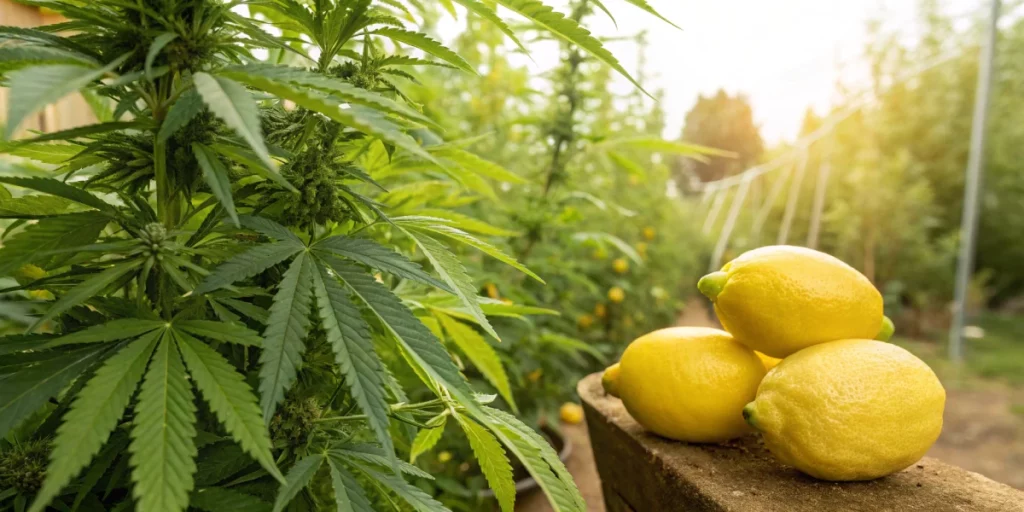Lemon Terpene is a naturally occurring compound found in citrus fruits and many cannabis strains. It offers a bright, zesty aroma and adds a refreshing note to cannabis profiles. This article walks you through everything about Lemon Terpene in a simple, clear language. Stay with us as we reveal practical details about its properties, applications, and how cultivation factors and extraction methods help maintain its potency.
Introduction to Lemon Terpene
Definition and Natural Occurrence
Lemon Terpene is a terpene that appears in lemon rinds, herbs, and various cannabis strains. It is known for its fresh, citrus aroma that many find uplifting. This compound naturally occurs in plants that produce citrus oils, contributing to their distinctive scent. Its presence in cannabis adds a bright note to the plant’s overall aroma. Many growers appreciate its natural occurrence as it enhances flavor profiles effortlessly.
Lemon Terpene is extracted from natural sources such as lemon peel and certain herbs. Its occurrence in cannabis is a result of the plant’s complex biochemical pathways. When plants are grown in optimal conditions, they produce higher amounts of this terpene. It plays an important part in the plant’s defense mechanism while also appealing to users who enjoy a zesty aroma. Its natural origins make it a favorite among enthusiasts.
Chemical Structure and Key Properties
The chemical structure of Lemon Terpene is composed of carbon and hydrogen atoms arranged in a ring structure with side chains. This structure gives it a distinct scent and contributes to its volatility. It is a small, non-polar molecule that easily evaporates, which is why its aroma is so noticeable. The key properties include its solubility in organic solvents and its ability to interact with other compounds in cannabis, creating unique flavor profiles.
Its molecular makeup explains why Lemon Terpene is so effective in altering taste and scent. The compound’s properties allow it to be easily integrated into various products without the need for extensive processing. Its stability under controlled conditions means that it retains its refreshing citrus characteristics even after extraction. Such properties are essential when producers aim for consistency and quality in cannabis extracts containing Lemon Terpene.

Sensory Attributes of Lemon Terpene
Aroma and Flavor Profile
Lemon Terpene offers a bright, citrus aroma that is both uplifting and invigorating. Its scent is reminiscent of freshly squeezed lemon juice and zesty peel, providing a crisp and clear fragrance. This terpene adds a layer of complexity to the overall sensory experience of cannabis, making the flavor profile more appealing to users. It brings a natural, tangy twist to the plant’s taste without overpowering other notes.
The flavor profile is light and refreshing. Users often note a tangy, lemon-like taste that complements other terpenes present in cannabis. This citrus component helps balance heavier, earthier flavors, creating a well-rounded sensory experience. The clarity and brightness of Lemon Terpene make it a sought-after component in both recreational and therapeutic cannabis products.
Comparison with Other Terpenes
Compared to other terpenes, Lemon Terpene stands out for its distinct citrus note. While myrcene and limonene share some similarities, offers a unique brightness that is less sweet and more zesty. It harmonizes well with floral and herbal terpenes, elevating the overall aroma without masking other characteristics. This makes it an excellent choice for creating balanced and enjoyable cannabis profiles.
Other terpenes may offer fruity or spicy tones, but Lemon Terpene consistently provides a clear citrus punch. Its refreshing quality contrasts with the deeper, muskier aromas of some strains, making it ideal for those who appreciate a light and clean scent. The comparison highlights how Lemon Terpene adds a vibrant, lively dimension to cannabis that sets it apart from many other aromatic compounds found in plants.
Applications and Benefits of Lemon Terpene
Impact on Cannabis Aroma and Flavor
Lemon Terpene greatly influences the aroma and flavor of cannabis. When present in a strain, it lends a distinct, lemony zest that makes the overall profile more appealing. This terpene works with other compounds to produce a balanced taste that many users find pleasant and invigorating. Its impact on aroma and flavor is a key reason why cultivators and extractors pay close attention to its levels during production.
Its contribution to the sensory experience enhances the appeal of cannabis products. Lemon Terpene’s natural citrus tone can brighten up the overall profile, making even robust strains more palatable. Many consumers prefer strains that incorporate Lemon Terpene for its ability to add a refreshing twist to the traditional cannabis flavor, making the product stand out in a crowded market.
Uses in Therapeutic and Industrial Contexts
Beyond its sensory contributions, applications in both therapeutic and industrial settings. It is used in aromatherapy for its uplifting scent and is believed to help promote a positive mood. In the industrial realm, it is incorporated into cleaning agents, perfumes, and flavor enhancers. Its versatility makes it an important compound not only in cannabis cultivation but also in broader consumer products.
The compound is favored in various applications because of its natural, clean scent. Many therapeutic formulations include to enhance relaxation and improve mood. Its use in industrial products also underscores its value as a natural additive that offers both functional and sensory benefits. As a result, remains a popular choice for product developers across different sectors.
Cultivation Factors Influencing Terpene Levels
Impact of Growing Conditions
Growing conditions have a significant impact on terpene production in cannabis plants. Factors such as light intensity, temperature, and humidity can alter the amount of Lemon Terpene produced during growth. Optimal conditions help plants express their full aromatic potential, while suboptimal conditions may lead to a decrease in terpene levels. Growers often adjust environmental settings to boost the production of desired compounds, ensuring that the plants develop a vibrant aroma.
Proper management of growing conditions supports higher yields of Lemon Terpene. When plants receive consistent light and stable temperatures, their natural processes work more efficiently. This leads to increased production of aromatic compounds and better overall plant health. Attentive care in the cultivation process is essential for achieving the ideal balance of terpenes in each harvest, ensuring a potent and flavorful crop.
Genetic Expression Variability
Genetic factors play a critical role in determining terpene levels in cannabis. Some strains are genetically predisposed to produce higher amounts of Lemon Terpene, while others may yield lower levels regardless of growing conditions. Breeders select for these traits to develop strains that consistently express the desired aromatic profiles. Genetic variability means that even under identical conditions, plants may vary in their terpene production, influencing the final sensory output of the harvest.
The influence of genetics on terpene levels underscores the importance of strain selection. When choosing varieties, growers may prioritize those known for robust production. This selection process helps ensure that the plants will deliver a consistent, pleasing aroma. Genetic factors, combined with optimal environmental management, contribute to the overall quality and potency of the final product.
Extraction and Preservation of Lemon Terpene
Effective Extraction Methods
Extracting from cannabis requires methods that preserve its delicate citrus notes. Solvent extraction, steam distillation, and CO2 extraction are common techniques used to isolate this terpene effectively. Each method has its benefits, but the goal is to maintain the integrity of the aromatic profile while achieving a high yield. Proper extraction techniques ensure that Lemon Terpene remains potent and retains its natural properties throughout the process.
Successful extraction depends on careful control of temperature and pressure to avoid degradation of the compound. Using gentle methods helps preserve the pure, refreshing scent of Lemon Terpene. Operators often experiment with different approaches to determine which method best retains the natural characteristics. The effectiveness of the extraction method is key to delivering high-quality products that showcase the vibrant citrus profile of Lemon Terpene.
Best Practices for Maintaining Potency
Maintaining the potency of Lemon Terpene after extraction involves careful storage and handling. Exposure to heat, light, and air can cause the terpene to degrade, diminishing its aroma and flavor. Best practices include using airtight containers, storing products in cool, dark environments, and minimizing exposure during processing. These steps help preserve the freshness and strength of Lemon Terpene, ensuring that its unique qualities remain intact until it reaches consumers.
Consistent care during storage is essential for long-term potency. By following established protocols, producers can ensure that the final product retains its vibrant citrus characteristics. Regular monitoring of storage conditions helps prevent degradation and maintains product quality. Adopting these best practices is an important part of the process, contributing to the lasting impact of Lemon Terpene in every cannabis extract and related product.

FAQs about Lemon Terpene
What is Lemon Terpene and where does it come from?
Lemon Terpene is a naturally occurring aromatic compound found in citrus fruits and cannabis plants. It contributes a bright, citrus scent to products and is valued for its refreshing flavor. This terpene naturally appears in lemon rinds, herbs, and select cannabis strains. It enhances sensory profiles and is used in various consumer goods for its pleasant aroma and versatile benefits.
How does Lemon Terpene affect cannabis aroma and flavor?
Lemon Terpene enhances cannabis by adding a distinct, zesty citrus note that balances and brightens the overall aroma. Its presence can make the flavor profile more appealing, providing a refreshing twist to robust, earthy tones. This terpene works synergistically with other compounds to create a harmonious sensory experience that is both uplifting and enjoyable, ensuring that each strain delivers a unique and enticing taste.
What are the best methods for extracting and preserving Lemon Terpene?
Effective extraction of Lemon Terpene involves using techniques such as solvent extraction, steam distillation, or CO2 extraction to capture its delicate citrus notes. After extraction, proper storage in airtight, cool, and dark conditions is essential to maintain potency. These methods help preserve the terpene’s natural aroma and flavor, ensuring that products retain their vibrant and refreshing qualities over time while delivering a consistent sensory experience.




